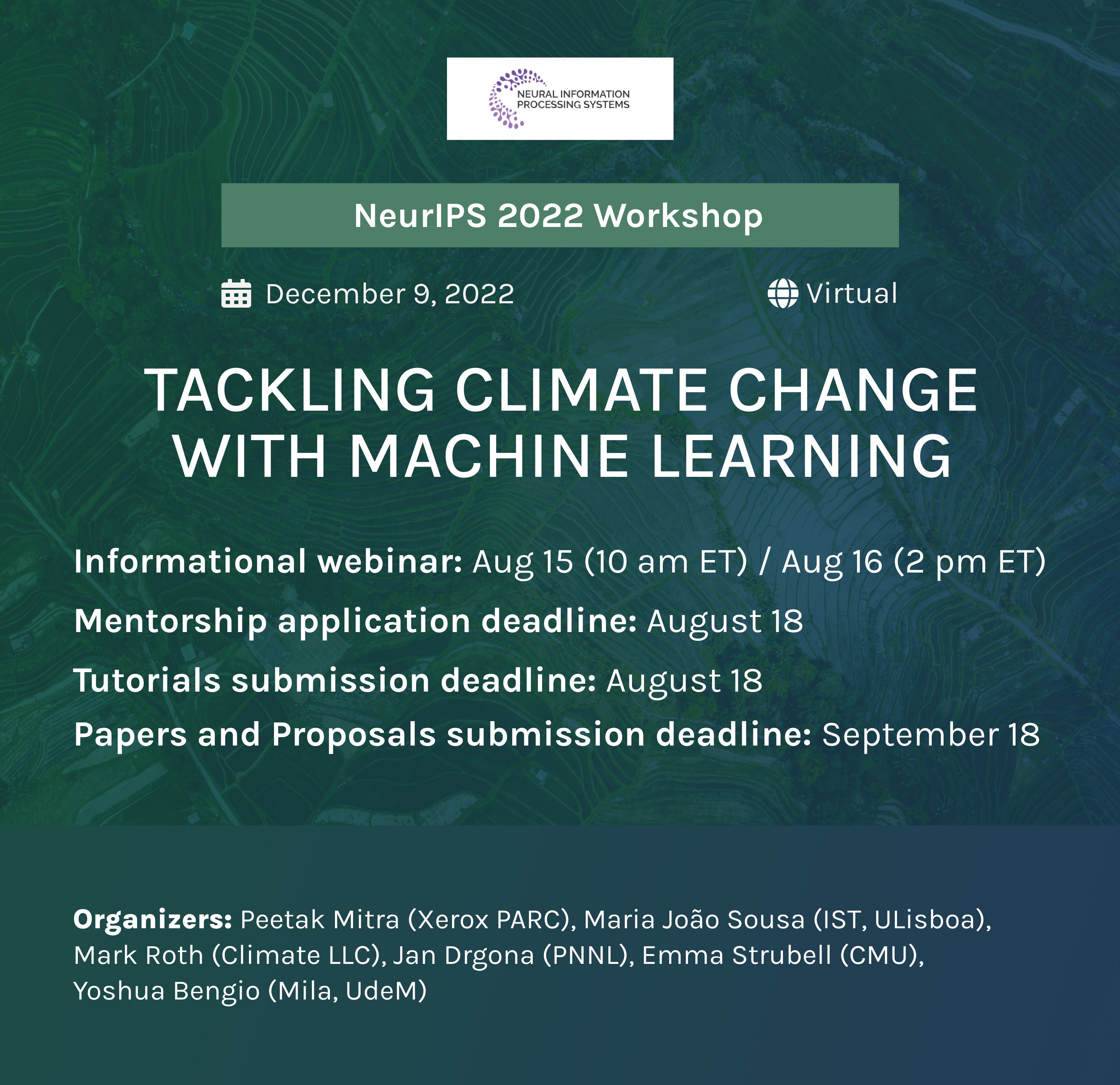Tackling Climate Change with Machine Learning Workshop at NeurIPS 2022
Author information for Climate Change AI's workshop

We are thrilled to bring another edition of Climate Change AI’s “Tackling Climate Change with Machine Learning” workshop at the upcoming NeurIPS 2022 conference! This workshop series is part of events CCAI has organized at major machine learning conferences such as ICML (2019, 2021), ICLR (2020) and NeurIPS (2019, 2020, 2021).
For this iteration of the workshop, the keynote talks and panel discussions features leaders from industry, academia, and government who will be particularly focused on exploring the theme of climate change-informed metrics for AI, focusing both on (a) the domain-specific metrics by which AI systems should be evaluated when used as a tool for climate action, and (b) the climate change-related implications of using AI more broadly.
We are currently accepting short papers (up to four pages) and proposals (up to three pages) at the intersection of climate change and machine learning until September 20th, 23:59 AOE.
We are also excited to announce a special issue for ‘Tackling Climate Change with Machine Learning’ where for the first time in this workshop series, interested authors will be invited to submit a full journal length article for publication in the Environmental Data Science journal.
Important resources regarding the workshop and special issue:
- Informational webinar video
- Past TCCML Workshop Papers
- Full Call for Submissions
- Special Issue from workshop
This post contains the high-level requirements for successful submissions to complement the informational webinar. We encourage you to explore previously accepted papers search tool on our website. The contributions featured at our workshops are non-archival in nature, and the authors are free to subsequently publish or present their work elsewhere, including at the special issue.
We have summarized below some key expectations from papers and proposals.
Successful papers (up to four pages, excluding references and appendix):
- Contain research with results
- Can be a work-in-progress
- Need not contain complex ML if the application is compelling
We encourage submissions that include dataset publication and describe deployed technologies.
Proposals should include (up to three pages, excluding references and appendix):
- A detailed plan for future work
- An explanation why solving your problem matters, how you plan to solve it
- Identify relevant stakeholders that play an important role in your proposed solution
Additionally, successful papers in our past workshops clearly explain the motivation of their study/analysis and the impact of the work therein. These submissions avoid jargon and explain/justify the use of ML. Lastly, the successful submissions are expected to:
- Illustrate the link: Explain the way in which your results could help address climate change. Theoretical work with a multi-step link is fine, as long as it is clearly communicated.
- Consider relevant stakeholders: Whose actions are you ultimately trying to influence? What insights would they find valuable?
- Outline key metrics: Quantitatively or qualitatively explain why solving your problem is important and how well you are doing versus other methods.
- Be clear and concise
- Convey the big picture: Explain how your work aligns with CCAI’s mission to “empower work that meaningfully addresses the climate crisis”
We encourage you to explore our website for more information at https://www.climatechange.ai/events/neurips2022 and reach out to us at climatechangeai.neurips2022@gmail.com with any questions. We look forward to your submissions and will hopefully see you (virtually) at NeurIPS!
Members of the organizing team,
Peetak Mitra (Xerox PARC), Maria João Sousa (IST, ULisboa), Mark Roth (Climate, LLC), Ján Drgoňa (PNNL), Emma Strubell (Carnegie Mellon University), Yoshua Bengio (Mila, UdeM)

